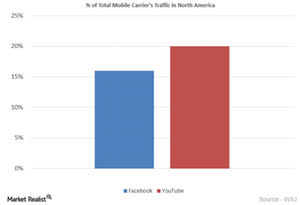How Will Facebook Deal with the Growing Use of Bandwidth?
Previously, Facebook (FB) accounted for less bandwidth usage than it does now. This has changed with the rising use of rich media content.
March 23 2016, Published 4:28 p.m. ET

Bandwidth usage growing
Internet use continues to increase due to growing online activities such as social networking, searching, and e-commerce. Social media users are increasingly sharing photos, videos, and other media.
Previously, Facebook (FB) accounted for less bandwidth usage than it does now. This has changed with the rising use of rich media content, which raises the challenge of providing seamless data flow for telecom operators. Facebook constitutes 16% of mobile carrier traffic in North America, slightly behind Google’s (GOOG) YouTube, which stands at 20%.
Netflix (NFLX), YouTube, and Amazon Video (AMZN) constitute 37.1%, 18.0%, and 3.1%, respectively, of fixed access network traffic in North America, according to Sandvine’s December 2015 report.
Telecom Infra Project
To overcome the situation, Facebook needs telecom operators and manufacturers to work together to build a design for an open-source wireless network. Facebook has undertaken a cross-industry engineering initiative called the Telecom Infra Project (or TIP).
TIP’s objective is to facilitate telecom operators’ building of network infrastructure for an easier and cheaper way to connect people in places that don’t have cellular services. The initiative will unite members such as Facebook, Intel (INTL), and Nokia to create reference designs and operators such as Deutsche Telecom and SK Telecom to deploy the technology. Moreover, the design and technology will be available for anyone to use and improve upon.
Facebook’s initiative is similar to its Open Compute Project, launched in 2011, to improve computer server hardware. The company is already exploring ways to bring the Internet to remote areas with its solar-powered drones, whereas Google is using balloons to spread Internet access.
Facebook constitutes 4.3% of the PowerShares QQQ, Series 1 ETF (QQQ).
